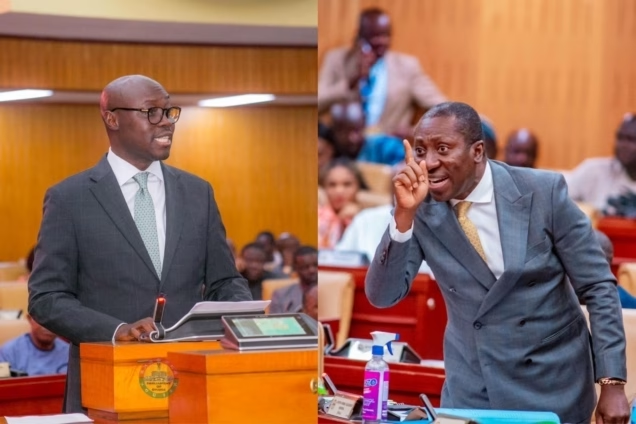Members of Parliament (MPs) from both the National Democratic Congress (NDC) and the New Patriotic Party (NPP) occupied seats on the majority side of the House, leaving the minority side completely empty.
This rare arrangement arises amid ongoing uncertainty regarding which party holds the majority, following Speaker Alban Bagbin’s declaration of four vacant parliamentary seats on October 17.
According to JoyNews’ Parliamentary Correspondent, Kwaku Asante, NPP Caucus Chief Whip Frank Annoh Dompreh took the Majority Leader’s seat, effectively blocking the NDC Caucus leader from occupying that position. In response, NDC MPs swiftly relocated the Minority Leader’s black chair from their side to the majority side, allowing their leader, Dr. Cassiel Ato Forson, to claim his place.
Mr. Asante noted that while all MPs sit on brown chairs, the leaders of both the majority and minority typically sit in designated black chairs. By occupying the black chair reserved for the Majority Leader, Mr. Annoh Dompreh effectively asserted the position for the NPP. Unperturbed, the NDC moved their Minority Leader’s chair to the majority side.
Despite the underlying tensions surrounding the leadership crisis, Kwaku Asante reported that the atmosphere in Parliament today was unexpectedly cordial. MPs from both the NDC and NPP were seen smiling and engaging in conversation, even while seated on the same side.
This latest development follows Speaker Bagbin’s declaration that four parliamentary seats—three held by the NPP and one by the NDC—were vacant, resulting in a shift in the balance of power within the legislature. With the NDC claiming 136 seats and the NPP reduced to 135, the NDC quickly proclaimed itself the new majority.
However, on October 18, the Supreme Court issued a stay of execution on Speaker Bagbin’s ruling, stating that the four MPs must continue to represent their constituencies until a final decision is reached. Despite this judicial intervention, the NDC caucus has maintained its claim to majority status, contending that the judiciary cannot interfere with the operations of Parliament, which operates as an independent arm of government.




